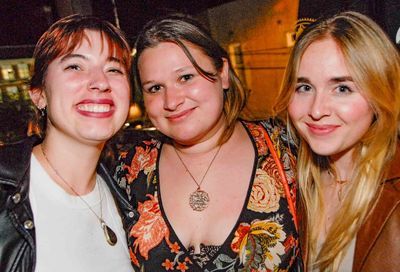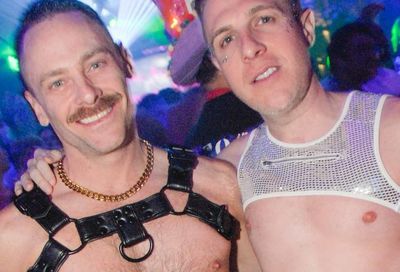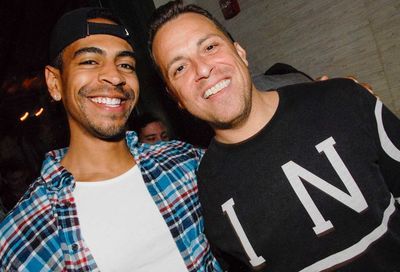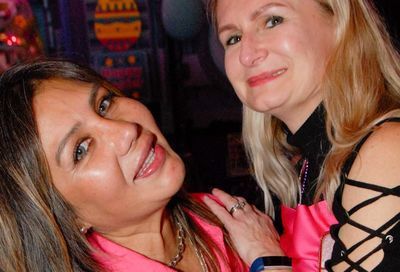Family Planning
Whitman-Walker's Maybe Baby parenting seminar tries to answer the 'if' and 'when' of adoption
It’s only November, but Annie Shaw, director of Whitman-Walker Clinic’s Lesbian Services Program, is already holding a hefty waiting list for the January session of the clinic’s popular Maybe Baby support group.
And she says that could only mean one thing: ”People want to have kids.”
Making that happen is Shaw’s mission. ”My goal is to give [gay] people the tools to help them decide if parenting is the right option for them right now,” she says. More than 30 people have signed up for the November session of Maybe Baby, the clinic’s three-day support group for prospective GLBT parents.
”Thirty years ago, if you were going to [live openly as] a lesbian or gay man, you gave up the idea of having children. But today people want to have kids and we can’t do it casually. We have to think about it and plan it.”
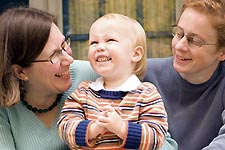 |
It took Amy Gotwals, a non-profit lobbyist, and her long-time partner Amy Wajda, a freelance graphic designer, nearly five years to think about and plan the birth of their son Charles. He was born to the Takoma Park couple in 2004.
”We were really in the ‘maybe’ stage,” Gotwals says. ”We came into [Maybe Baby] with a philosophical approach because my partner needed time and space to explore the larger questions about [parenthood]. It made me realize that I had a lot more questions than I actually thought I did.”
To help answer those questions, participants are given the chance to exchange dialogue with attorneys specializing in family law issues, including Michele Zavos, who is also credited as one of the founders of Maybe Baby; Susan Silber, a lesbian mother-of-two, who attended the first Maybe Baby support group in 1982; and S. Micah Salb, a gay dad and current facilitator of the support group.
With the help of these experts, Shaw says she hopes to help lesbians and gays gather the information they need on the basics of having a family, and what happens after one becomes a parent.
”We also talk about what it means to have a family, be a parent, the changes in lifestyle that are required and [the readiness to do so],” she says.
Gotwals and Wajda addressed all these issues before giving birth to Charles.
”Once you get the kid and they’re throwing tantrums you’re just like every other family,” Gotwals says. ”But when you’re preparing for parenthood, it’s important to talk about those issues that require a lot of thoughtfulness and a safe space to explore them, with people who are exploring the same things.”
Maybe Baby explores a variety of such topics, including legal and financial issues, fertility and reproductive health, and the various types of adoption.
”Gay people are on a totally different playing field when it comes to parenting,” Shaw says. ”Parenting doesn’t happen by accident as readily for us. With us it’s more conscious. We have to decide if it is right for us.”
 |
Both Nathan Monell, executive director of Foster Care Alumni of America (FCAA), and his partner, Shepherd Faught, a CPA attorney at Ernst & Young, wanted to have children even before they met each other in 2001.
”Part of the reason we came together as a couple was our mutual desire to adopt and raise children,” Monell says. ”A year or so after we got together we started exploring the adoption process and that’s what brought us to Maybe Baby.”
In 2005, the Falls Church couple adopted two children — Gonzalo, 4, and Kira, 2 — from Guatemala, with the help of the Datz Foundation, one year after taking part in Maybe Baby.
Monell says that even though Maybe Baby made the process of adoption easier, he wasn’t prepared for everything.
”No one can prepare you for how challenging and absolutely rewarding it is to watch their personalities grow and unfold,” he says of his two children.
Maybe Baby has grown since its initial session in 1982. Silber, who has two children that she co-parented with a gay friend and her former partner, was pregnant when she attended that first meeting. She recalls the experience as ”invaluable.”
”There was a real sense of support, and a place to talk about our dreams and concerns and later to have a support network of kids who have two moms or two dads.” Many participants, including Silber, turn to organizations such as Children of Lesbian & Gays Everywhere (COLAGE) and Rainbow Families after they have children.
Today, Maybe Baby is held about five times a year and operates as a three-day seminar. But for the past several years, Maybe Baby had been held weekly over the course of eight weeks, with two-hours per session. This year, Shaw says, organizers also decided to merge the male and female groups into one.
Zavos says she has noticed an increase in the amount of gay men who are attending the Maybe Baby meetings.
”In the past it has been mostly women, but more and more men are attending,” she says. ”I think because of our culture, and how our culture pushes women to be mothers, it does not push men the same way….
”I see almost as many men as women who are bringing children into their families now.”
Those men include Salb who says he faces challenges as a father, but none that are unique to being a gay dad.
”It doesn’t take long after you have a child, that you begin to feel that you are just a dad, and not a gay dad,” he says.
Shaw, a former social worker for various area nursing homes, began volunteering for Whitman-Walker in 2003. She replaced Ellen Kahn as director of the clinic’s Lesbian Services Program in April 2006. Shaw credits Kahn as the person responsible for Maybe Baby’s most recent advancements.
Despite the changes that have taken place throughout the support group’s evolution, Shaw says the need for Maybe Baby remains the same.
”We’ve had public adoption agencies, like D.C.’s [Child & Family Services Agency], come to us because they have 2,000 kids in foster care and 500 for adoption, and they’re reaching out to the gay and lesbian community to help them find homes,” she says. ”We are loving individuals who can do that.”
For more information on the Maybe Baby program, visit www.wwc.org.
Support Metro Weekly’s Journalism
These are challenging times for news organizations. And yet it’s crucial we stay active and provide vital resources and information to both our local readers and the world. So won’t you please take a moment and consider supporting Metro Weekly with a membership? For as little as $5 a month, you can help ensure Metro Weekly magazine and MetroWeekly.com remain free, viable resources as we provide the best, most diverse, culturally-resonant LGBTQ coverage in both the D.C. region and around the world. Memberships come with exclusive perks and discounts, your own personal digital delivery of each week’s magazine (and an archive), access to our Member's Lounge when it launches this fall, and exclusive members-only items like Metro Weekly Membership Mugs and Tote Bags! Check out all our membership levels here and please join us today!




















